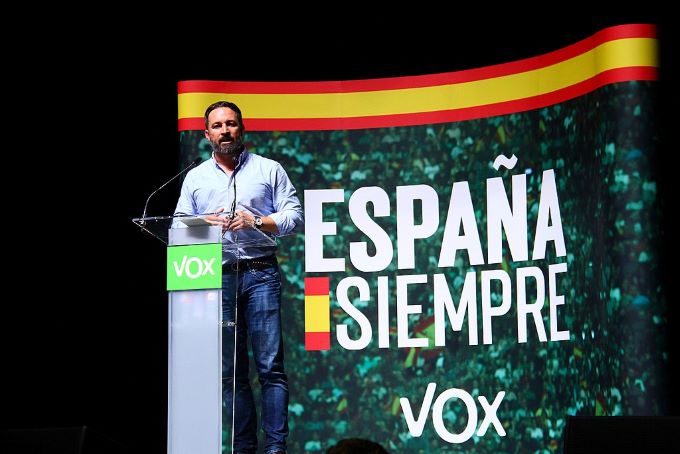July will remain in Vox’s history as the month of the radical shift of the Spanish far-right party, translated into two actions the party took over on a national and European level. On the national level, Vox ended the alliance with the conservative People’s Party (PP), abandoning the autonomous governments on the pretext of an immigration case – of a humanitarian kind – that emerged recently in Spain. On the European level, Vox defected from the European Conservatives and Reformists (ECR) group of Giorgia Meloni after secretly negotiating with the Patriots for Europe (PfE) group of Marine Le Pen. However, it seems that Vox leader Santiago Abascal’s decisions didn’t harm but benefited both the conservatives in Spain and the ECR.
Vox’s radical views on several issues burdened the Spanish conservatives and the ECR. Abascal’s new political path risks bringing Vox into national and international isolation, while another Spanish far-right grouping that emerged in the European elections represents a dangerous concurrent. Were his movements due to miscalculation?
Autonomous governments without Vox?
Abascal announced that Vox is leaving the PP-led coalition governments in five Spanish autonomous regions. This decision affects the autonomous governments of Extremadura, Murcia, Castilla y León, País Valencià, and Aragón, leaving the PP to govern alone. Vox will also withdraw parliamentary support from the popular parties in these regions.
The controversy stems from the PP’s decision to accept nearly 400 unaccompanied immigrant minors into Spain despite warnings from Abascal. This move comes when polls indicate that immigration is a low priority for Spanish society.
The People’s Party (PP) is optimistic about the split with Vox, as they believe it could benefit the conservative party. Alberto Núñez Feijóo, PP’s President, described Abascal’s move as “crazy.” Vox’s decision deprives the ruling Workers Socialist Party (PSOE) of the narrative that the PP capitulated to far-right pressure. Additionally, PP’s firm stance on the reception of immigrant minors, which led to the split with Vox, benefits the image of PP as a centrist-right party.
Moreover, the PP recently reached an agreement with the PSOE on the renewal of the General Council of the Judiciary and a law reform to address politicisation.
It is not a minor issue that Abascal’s decision wasn’t enthusiastically accepted by many local leading members, allowing speculations of a possible split by the party’s moderates.
A dangerous concurrent
However, Vox is no longer alone in the Spanish far-right scene. ‘The Party is Over’ (Se Acabó La Fiesta—SALF), founded in April 2024 by the social media personality (on Telegram) Luis “Alvise” Pérez Fernández, was proven a successful competitor for the party of Abascal. SALF extensively used social media to incorporate Vox’s “anti-establishment” and anti-immigration rhetoric and penetrated its electoral base.
Significantly, this battle in the social media field deprives Vox of its dominant position. In an interview with European Interest in 2019, Carmen Aguilera-Carnerero, a specialist on the VOX and far-right movements in Spain, said, “VOX has been by far the most communicatively efficient Spanish political force in social media”. This enabled the party to communicate with young people. Now, it seems that the politicians of Vox get old, allowing a grouping of electors, founded a few months before the European elections, to take a prominent place within the Spanish far-right. Indeed, Vox won six seats in June’s elections and the SALF three.
This pressure exerted on Vox may also be a reason for the recent radical decisions of Abascal.
Defecting ECR for Marine Le Pen
On July 3, the ECR group in the European Parliament announced its constitution. Vox was among the 18 constitutive parties with the addition of an independent MEP from Estonia. Moreover, Vox intended to play a leading role in the group. His MEP, Hermann Tertsch, was also elected as one of the four vice-chairs of the group.
However, two days later, Santiago Abascal decided to defect to Marine Le Pen’s PfE group. The news wasn’t surprising. Vox nurtured close relations with Le Pen’s National Rally in the previous years and adopted many of its political positions. Also, the ties with the Portuguese party Chega, an Identity and Democracy member, brought Vox closer to the ID group.
Abascal has also had relations with Viktor Orbán – one of the leaders of PfE – since their meeting in Budapest in November 2021. The two discussed their parties’ future cooperation and joint action against “globalists.”
In addition, Vox is far more radical than many ECR parties and didn’t appreciate Meloni’s abstention during the vote to re-elect Ursula von der Leyen as President of the European Commission.
Thus, it was a surprise that Vox was among the leading parties of ECR on July 3.
Was this change of camp also a miscalculation? Although PfE is the third group in the European Parliament, all other groups implemented a cordon sanitaire around it to prevent its representation in the Parliament’s committees and subcommittees. However, ECR elected three chairs and several vice-chairs. Vox lost the possibility of winning a committee vice chair position because of a PfE member.
Vox will experience the isolation the parties of Marine Le Pen, Geert Wilders, or Matteo Salvini have experienced for years within the European Parliament. As a PfE member, Vox will be an easy target for the other Spanish parties. Moreover, PfE’s pro-Russia environment could eventually push the Spanish party to reconsider its pro-Ukraine stance. Then, the concurrence from SALF will be challenging, as the grouping has already adopted anti-Ukrainian positions.
In conclusion, Vox’s decisions are risky as they could cause internal disputes and threaten the party’s stability.

